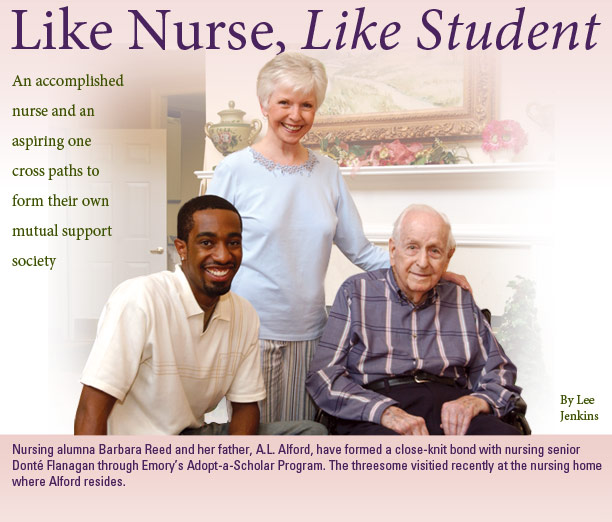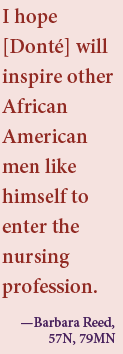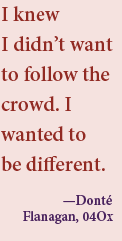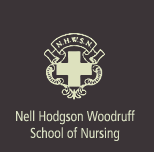














|
 |
| |
|
|
 |
 t
age 21, Emory nursing senior Donté Flanagan, 04Ox, is ready
to take on the world. He is armed with a solid résumé,
a definitive career goal, and an “adoptive” nursing
mentor. t
age 21, Emory nursing senior Donté Flanagan, 04Ox, is ready
to take on the world. He is armed with a solid résumé,
a definitive career goal, and an “adoptive” nursing
mentor.
Flanagan has experience as a middle
school basketball coach as well as a camp counselor, mentor, and
tutor for three summers in his hometown of Chattanooga. At Oxford
College, he served as vice president of the Freshman Council, made
the Dean’s List, and tutored underprivileged children for
an after-school program and a church in town. During his junior
year at the School of Nursing and this past summer, he worked as
an extern in the cardiac department at DeKalb Medical Center.
Although his portfolio could take
Flanagan far in his own right, his confidence and career prospects
are even stronger, thanks to Barbara Reed, 57N, 79MN. Their paths
crossed when Reed “adopted” Flanagan through the Adopt-a-Scholar
Program, which offers alumni a way to honor their time at Emory
with a named scholarship for a student who needs financial assistance
with tuition. “It helps as a financial gift and also helps
give the student a key person to talk to for advice and any other
help they may need while attending nursing school,” says Flanagan.
when Reed “adopted” Flanagan through the Adopt-a-Scholar
Program, which offers alumni a way to honor their time at Emory
with a named scholarship for a student who needs financial assistance
with tuition. “It helps as a financial gift and also helps
give the student a key person to talk to for advice and any other
help they may need while attending nursing school,” says Flanagan.
The two caregivers may be generations
apart, have different ethnic backgrounds, and focus on opposite
ends of the patient spectrum—Reed is a geriatric nurse and
Flanagan wants to be a pediatric emergency room nurse—but
they have much in common. Both experienced similar struggles with
student loans, educational challenges, and well-meaning advisers
who tried to steer them away from nursing.
“Barbara has given me great
advice and motivation,” says Flanagan. “When I first
started nursing school, a lot of what my teachers covered was review
for me because I already had learned a lot in the clinical setting.
She told me to stay in there because I would learn many extra things.
She was right.” Reed also has helped him relate more easily
with his fellow students, most of whom are women.
“Donté’s such a
well-rounded person,” says Reed. “I hope he will inspire
other African American men like himself to enter the nursing profession.” |
 |
| |
 |
|
 |
Staying
the Course

|
 |
 |
 lanagan
says he is confident about what he can achieve in a compassionate,
hands-on profession like nursing, despite the advice of high school
peers and leaders who encouraged him to pursue a high-profile profession
like medicine or law. His father told him to follow his heart and
not let anyone change his mind. “I knew I didn’t want
to follow the crowd—I wanted to be different,” Flanagan
remembers. lanagan
says he is confident about what he can achieve in a compassionate,
hands-on profession like nursing, despite the advice of high school
peers and leaders who encouraged him to pursue a high-profile profession
like medicine or law. His father told him to follow his heart and
not let anyone change his mind. “I knew I didn’t want
to follow the crowd—I wanted to be different,” Flanagan
remembers.
Reed might have taken a different
career path if she had listened to her high school counselor. “He
told me, ‘You don’t want to be a nurse. You know that
nurses are not nice girls—they’re fast and loose,’
” she says, looking back with amusement on his stereotypical
notion. At his suggestion, Reed attended Mercer University for two
years, but she still wanted to be a nurse. This time, she turned
to her father for advice. “You should go to Emory and get
a four-year degree,” he advised his daughter. “That’s
more important for your career.”
Encouraged, Reed decided to continue
her education and in the meantime also got married. Although their
parents offered to help pay for their tuition, the couple took out
student loans to pay for their last two undergraduate years at Emory.
“We felt that since we had chosen to get married while we
were still in school that it was our responsibility to pay for our
education,” says Reed. Consequently, the young couple learned
the meaning of financial sacrifice. “That’s one reason
why I wanted to give back to my school and help someone else who
needs help with tuition,” she adds.
After graduation, Reed followed her
passion, serving as the head nurse on Emory University Hospital’s
obstetrics floor and then working part time on a surgical unit after
her two children were born. She completed Emory’s gerontological
nurse practitioner program and the master’s program in the
late 1970s and served as a clinical faculty member in the School
of Nursing throughout much of the 1980s and 1990s. Still, Reed’s
heart belonged to patient care. At Emory Hospital, she was a clinical
specialist in surgical nursing from 1981 until 1988 and a clinical
nurse specialist in pain management from 1988 until she retired
in 1996.
Never one to sit still, Reed is a
pain management consultant and one of four nursing alumni who currently
serve on the university’s Board of Governors. During a committee
meeting, Reed learned about the Adopt-a-Scholar Program from its
founder, Francine Cronin, assistant vice president of annual giving
at Emory. Intrigued, Reed sought advice once more from her 96-year-old
father, A.L. Alford, about helping finance a nursing scholarship.
Now that both are involved in the program, Reed hopes to encourage
other alumni to participate too.
Through the Adopt-a-Scholar Program,
Reed and Alford provided a $2,500 annual scholarship for Flanagan
during his junior and senior years of nursing school. They also
will provide $2,500 scholarships for each of his two years of graduate
school. The $10,000 total will greatly offset Flanagan’s student
loans.
“We try to give students opportunities
to meet with their alumni mentors so that donors can see exactly
where their money is going by seeing the students in action,”
says Rachel Donnelly, director of annual giving for Health Sciences
 Development. “Students like the unlimited access to alumni.
They like to know what mistakes their mentors made in their careers
and get their advice.”
Development. “Students like the unlimited access to alumni.
They like to know what mistakes their mentors made in their careers
and get their advice.”
Joann Hayes, 56N, 60MN, a retired
public health nurse with the Chatham County Health Department in
Savannah who recently joined the program, will meet her adopted
scholar this fall. She created a scholarship to honor her sisters,
Virginia Cooper, 50N, and Elizabeth Wilson, who both helped finance
her nursing education.
“I was very interested in the
program after hearing about it from Rachel,” says Hayes. “It
doesn’t matter if the scholarship helps a student interested
in public health, just as long as he or she wants to be a nurse.”
Flanagan knows from his experience
working with kids in the community that pediatric nursing is his
passion. After graduation, he plans to work for a year and then
complete Emory’s graduate emergency nurse practitioner program,
specializing in pediatrics. He’d like to work in a community
clinic, most likely in the inner city, where he can get to know
his young patients personally. Because nursing offers flexible hours
and opportunities in any city, Flanagan one day hopes to live near
the ocean, where he can enjoy his scuba diving hobby.
Wherever Flanagan settles, he can
always count on Reed for advice and friendship. They talk often
and dine regularly at a local restaurant with Reed’s husband
and Flanagan’s girlfriend. “I am really impressed with
Donté,” Reed says. “When we met for the first
time at lunch, he had just worked all night at DeKalb Medical Center.
As we talked and got acquainted, he was congenial, articulate, and
enthusiastic about nursing, even though I knew he must be really
tired. I immediately liked him. I am also proud of his accomplishments,
and my dad and I look forward to keeping up with his career as he
does great things in nursing.”
Lee
Jenkins is an Atlanta freelance writer.
|
 |
| |
 |
|
 |
| |
 |
|
 |
How
to Adopt a Scholar |
 |
| |
 |
|
 |
 arbara
Reed, 57N, 79MN, and her father, A.L. Alford, have created
the Barbara Alford Reed Scholarship to provide $2,500 annually
to help finance four years of Donté Flanagan’s
nursing education. Reed chose to support the Adopt-a-Scholar
Program because “I wanted to help someone who needs
financial assistance to become a nurse,” she says. “It’s
a wonderful bonus to meet that person.” arbara
Reed, 57N, 79MN, and her father, A.L. Alford, have created
the Barbara Alford Reed Scholarship to provide $2,500 annually
to help finance four years of Donté Flanagan’s
nursing education. Reed chose to support the Adopt-a-Scholar
Program because “I wanted to help someone who needs
financial assistance to become a nurse,” she says. “It’s
a wonderful bonus to meet that person.”
To adopt a scholar, donors must
commit a minimum gift of $2,500 throughout a student’s
years at Emory. Donors may provide a greater amount of financial
aid, up to the cost of a full year of tuition. The university
provides opportunities throughout the year for alumni donors
and adopted scholars to meet.
To learn more about the Adopt-a-Scholar
Program, contact Rachel Donnelly, director of annual giving
for Health Sciences Development, at (404) 727-4241 or rachel.donnelly@emory.edu. |
 |
| |
 |
|
|
 |
| |
 |
|
|
|
|











